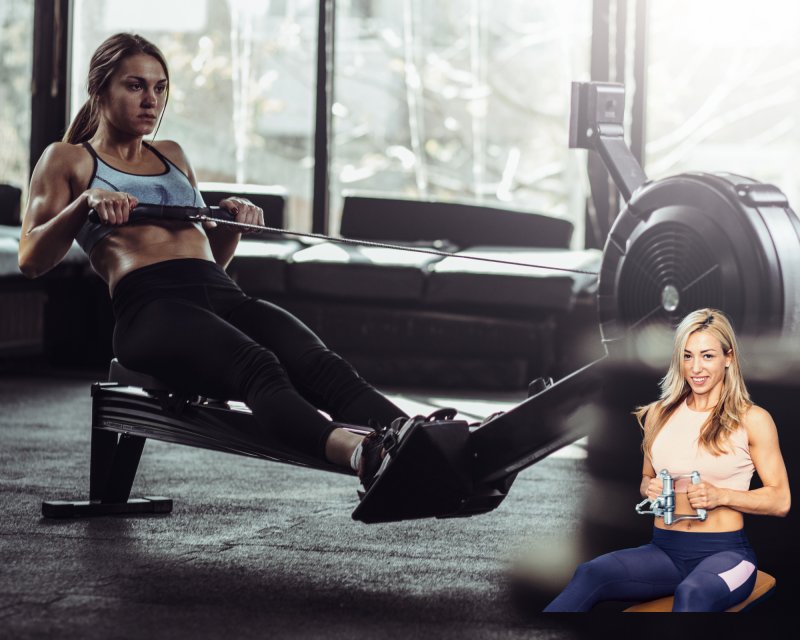Introduction
Let’s be honest—between busy work schedules, unpredictable weather, and the never-ending list of excuses, sticking to a fitness routine is tough. But what if you could get a full-body, sweat-drenching, heart-pumping workout in your living room? That’s where the rowing machine comes in.
This underrated indoor fitness equipment is more than just a bulky item in the corner of your gym. It’s a powerhouse that burns calories, builds strength, improves heart health, and supports mental clarity—all without stressing your joints. Whether new to fitness or looking to spice up your workout routine, the rowing machine has something for everyone.

What Is a Rowing Machine?
Brief Overview
A rowing machine, often called an ergometer or “erg,” mimics the motion of rowing on water. It offers a full-body cardiovascular workout from the comfort of your home.
Key Components and Mechanics
Every rowing machine typically includes:
-
A handle that you pull
-
A sliding seat that moves as you row
-
Footrests with straps for support
-
A resistance mechanism (air, water, magnetic, or hydraulic)
You push with your legs, pull with your arms, and engage your core—delivering a synchronized, high-efficiency workout.
Different Types of Rowing Machines
-
Air Rowers: Great for athletes; resistance increases with intensity.
-
Magnetic Rowers: Quiet and smooth—perfect for home use.
-
Water Rowers: Offers the most natural rowing feel.
-
Hydraulic Rowers: Affordable and compact, good for small spaces.
The Full-Body Benefits of Using a Rowing Machine
Cardiovascular Health
Rowing increases your heart rate and oxygen intake, improving lung capacity and overall cardiovascular endurance. It’s great for heart health and helps reduce the risk of heart disease.
Muscle Engagement from Head to Toe
Rowing activates more than 85% of your muscles! Legs, back, arms, core—even your grip gets stronger. It’s rare to find a cardio machine that doubles as resistance training.
Low-Impact, High-Reward
Unlike running, rowing is low-impact, making it safe for joints. It’s ideal for people recovering from injuries or those with chronic joint pain.
Mental Health Benefits
Stress Relief
The repetitive, smooth motion of rowing can be incredibly calming. It’s almost meditative and a great way to decompress after a long day.
Boosting Mood with Endorphins
Just 20 minutes of rowing can trigger the release of endorphins—those natural mood boosters that make you feel amazing.
Meditation in Motion
The rhythm of rowing promotes mindfulness. Your breath, your body, and the rower sync up—almost like yoga on a machine.
Why a Rowing Machine Beats Other Indoor Machines
Treadmills vs. Rowers
Treadmills mainly work your legs and can be hard on your knees. Rowers deliver a full-body workout without the impact.
Bikes vs. Rowers
Exercise bikes are great for lower-body workouts but don’t engage the upper body. Rowers work everything—more bang for your buck.
Ellipticals vs. Rowers
Ellipticals are low-impact too, but rowers challenge your coordination, balance, and power on a deeper level.
Rowing and Weight Loss
Calorie-Burning Potential
A 30-minute moderate rowing session can torch 300 to 500 calories, depending on your weight and intensity.
HIIT with a Rowing Machine
Rowing is excellent for High-Intensity Interval Training (HIIT). Alternate sprints with slow rows to maximize fat burn and build endurance fast.
Sustainable Fat-Burning
Rowing helps you build lean muscle mass, which increases your resting metabolic rate—so you keep burning calories even at rest.
Rowing for All Ages and Fitness Levels
Adjustable Resistance and Beginner-Friendly
Rowers offer adjustable resistance, making them perfect whether you’re a beginner or an elite athlete.
Safe for Joints and Seniors
Rowing is gentle on knees, hips, and ankles—great for older adults or anyone recovering from injuries.
Scalable to Any Fitness Goal
Want to lose weight, build strength, or boost cardio? You can tailor your rowing routine to match any goal.
Building a Routine with a Rowing Machine
How to Start
Begin with 10–15 minutes at a light pace. Focus on mastering proper form before increasing intensity.
Sample Weekly Plan
-
Monday: 15 min steady-state row
-
Tuesday: Rest or strength workout
-
Wednesday: 20 min interval session
-
Thursday: Light row + stretching
-
Friday: 30 min moderate pace
-
Saturday: HIIT rowing
-
Sunday: Complete rest
Mixing with Strength Training
Pair your rowing with bodyweight exercises or free weights. It’s a killer combo for full-body fitness.
Choosing the Right Rowing Machine
Magnetic, Water, Air, and Hydraulic
Choose based on your space, budget, and workout style. Water rowers are beautiful and natural, while magnetic rowers are quiet and compact.
Features to Look For
-
Adjustable resistance
-
Smooth glide and durable track
-
Ergonomic handle and padded seat
-
Digital display for tracking stats
Budget-Friendly vs. High-End
Budget machines can cost around $250, while premium models like Concept2 go beyond $1,000. Consider it an investment in your health.
Setting Up Your Indoor Rowing Space
Compact Options for Small Spaces
Many rowers fold vertically or slide under a bed—ideal for apartment dwellers.
Accessories That Help
-
Non-slip mat
-
Heart rate monitor
-
Bluetooth speaker or earbuds
Motivating Environment
Put your rower near a window, TV, or mirror. Add inspiring playlists or use apps to stay pumped.
Common Mistakes to Avoid
Form and Posture Errors
Bad form can cause injury. Keep your back straight, push with your legs first, then pull with your arms.
Overtraining or Undertraining
Avoid burnout. Consistency is more important than intensity when starting out.
Ignoring Warm-Up and Cool-Down
Always warm up with light rowing and finish with stretches. Your body will thank you.
Tips to Stay Consistent
Tracking Progress
Use fitness apps or the rower’s monitor to track your workouts, distance, calories burned, and progress over time.
Using Rowing Apps or Virtual Races
Apps like ErgZone or CITYROW Go offer structured workouts, coaching, and community races to keep you engaged.
Mixing Up Workouts to Avoid Boredom
Change it up! Try different intervals, tempos, or row to the beat of your favorite songs.
Real-Life Success Stories
Weight Loss Transformation
People have shed 30–100 pounds through consistent rowing combined with diet changes. The proof is in the sweat.
Improved Endurance and Athletic Performance
Runners and cyclists use rowing to cross-train. It helps build endurance without overworking the same muscle groups.
Expert Opinions on Indoor Rowing
What Fitness Trainers Say
Trainers love rowers for their ability to combine cardio and strength in one movement.
What Doctors Recommend
Doctors often suggest rowing for patients needing low-impact cardio, especially for weight management and joint health.
Conclusion
So, if you’re looking to invest in your health without ever stepping foot outside, a rowing machine might just be your new best friend. It’s efficient, full-body, joint-friendly, and crazy effective for burning fat, building muscle, and clearing your mind.
Whether you’ve got 15 minutes or a full hour, your rowing machine can transform your body—and your life. Ready to pull yourself into better health?
FAQs
1. Is 20 minutes of rowing a day enough?
Yes! A 20-minute session can improve cardiovascular health, burn calories, and tone muscles effectively.
2. Will rowing help me lose belly fat?
Rowing burns fat overall, including belly fat, especially when combined with proper nutrition and consistent workouts.
3. Is rowing safe for bad knees?
Yes. Rowing is low-impact and ideal for people with knee problems or those recovering from injury.
4. Can seniors use a rowing machine?
Definitely. With proper form and pacing, seniors can greatly benefit from rowing for strength and mobility.
5. How soon will I see results from rowing?
Many users report seeing improved energy, weight loss, and better endurance within 2–4 weeks.
